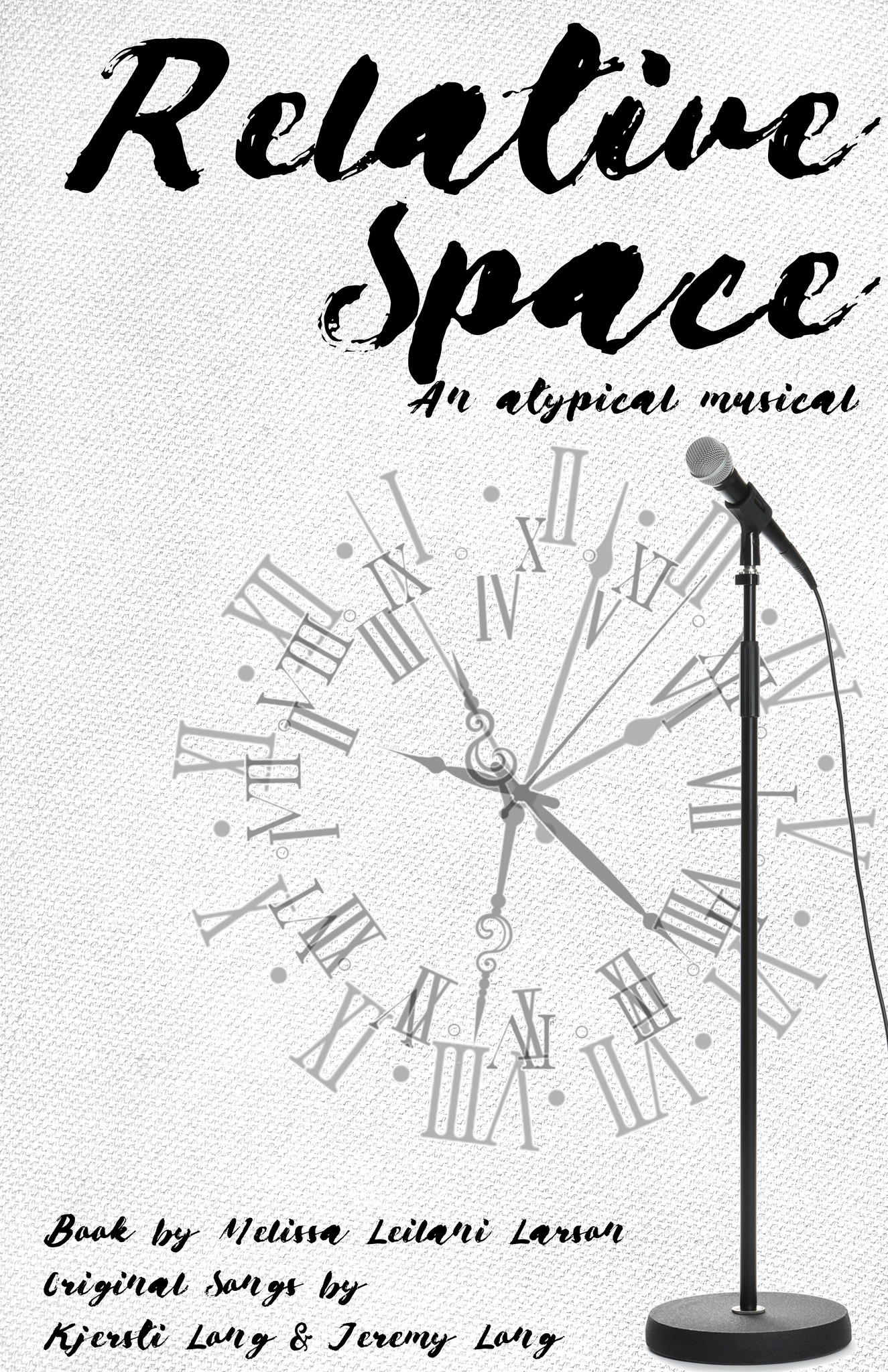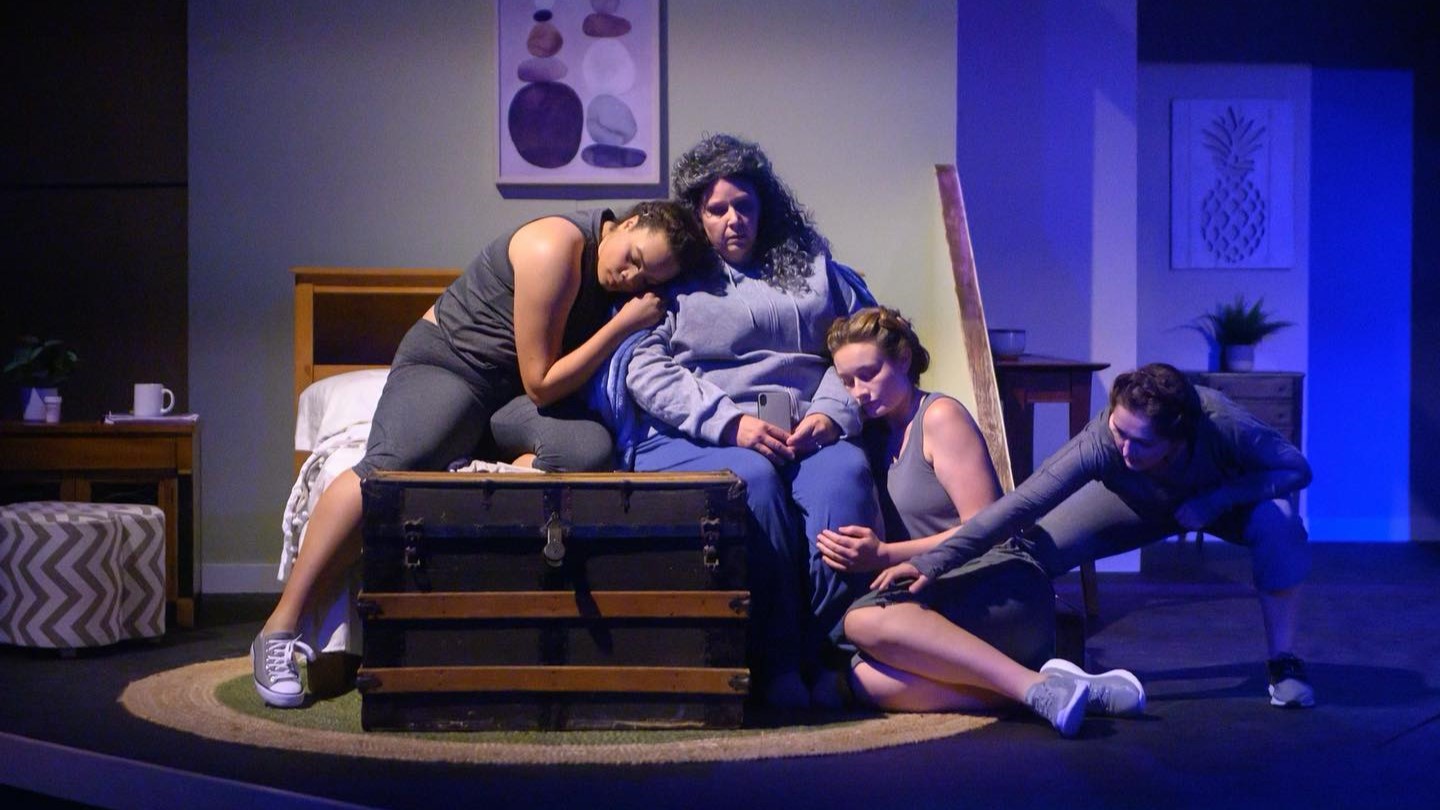PLEASANT GROVE — As a theatre critic, I love the chance to see my reliable favorite musicals like Les Misérables or The Music Man, but not as much as I love seeing new musicals and plays written and created by local talent. Creekside Theatre Fest is the latest Utah theatre company to give audiences the treat to see a world premiere, with their current production of Relative Space. Billed as an “atypical musical,” Relative Space is definitely a work in progress that has some potential to improve on its start.

I am inclined to call Relative Space “a play with music,” rather than “an atypical musical,” but regardless of the terminology, it is a unique set-up for a show. The songs are written by Kjersti Long and Jeremy Long, and evidently Kjersti Long began work on the songs at the young age of 14. Now 16, she performs the songs on a platform above the actors, almost narrating the events as they go on. The songs have a rock styling, and audience’s enjoyment will depend strongly on their taste for rock music. Kjersti Long could enunciate the lyrics better; my difficulty in understanding them reduced their power and impact on the overall story. Also, her use of a stand microphone made some of the sound a little harder to understand.
The strength of this show is the book by Melissa Leilani Larson (whom I previously interviewed for UTBA). She has crafted a story about three generations of women, in three different decades, and their battles with mental health and even suicide. There are insightful lines like when one character says, “Love is about being unhappy sometimes.” Larson also rewards her audience for their investment into the characters, such as when one woman states, “If I slow down I think about my mother,” a line which makes sense in the next scene that shows the mother and the legacy she has left her child. I also liked when the daughter says, “Sometimes I think the world is too heavy for me to hold it up. What will happen if I let it go?” Nearly everyone will be able to relate to either the principal mother character Shannon or her daughter Britt (or possibly both), no matter the era they are in.
Shannon is played by Elizabeth Golden, and she sells the emotion in each era. Golden shows that how in each generation, the women in the family becoming paradoxically more controlling and yet less in control of her daughter. Leah Carr is also excellent as Britt in, a demanding role which includes suicide as a plot element. (Audiences should be aware if they are triggered by such themes.) Both Carr and Golden succeed in conveying the profound emotions of their characters; both cry on stage and succeeded in making me shed tears as well. They also have believable chemistry as that make them seem like a real mother-daughter pair in each of the three eras. The rest of the cast is fine in their small roles, and there is a “movement ensemble” which brings an abstract dance element to the show and helps with the transitions from each decade 1970s, 1990s, and 2020s.
Detracting from the writing and acting are a couple nitpicks in the production design, which did not always match the script’s depiction of teenage daughters chaffing against their mothers. For example, Britt in the 2020s is supposed to be a rebellious artist who does not want to go to school. Set designer Brad Shelton decorated Britt’s room with a prominent poster for the film Little Women, which does not strike me as edgy artist film which young teenage Britt would be a huge fan of. In the action set in 1999, a young Shannon is a superfan of Titanic and “Leo and Kate,” which was the most mainstream popular opinion a teen could have at that time (I graduated from high school in 1999 and remember it well!). In the 1970s, Shannon’s mother wants to see The Way We Were, which again wasn’t counter-culture at all. Perhaps set designer Shelton and Larson could have chosen other given theatre lovers a treat by giving the daughters a passion for Broadway musicals, such as Hair in the 1970s, Rent in 1990s, or Spring Awakening in 2020s.
It would also help establish the era if the musical style change to reflect the time period of a scene. Currently, the score is all Matchbox Twenty-style rock music, which really only feels at home in the 1990s, rather than 2020s or 1970s. As it is, the songs all kind of run together and start to feel the same (a tendency that might be lessened with some improved diction).
Relative Space is directed by Shelby Noelle Gist and Joshua Long, who get a lot of earned emotion out of their actors. They also work with Shelton’s set to bring us into and out of each era (aside from the poster complaint.) The 9-person onstage band is also impressive, and they play the orchestrations by Zach Hansen (who also serves as the band’s keyboards player) well.
So, does Relative Space have a future? I think the play has a long way to go before being able to make it in New York City or an Equity venue. In particular, the music needs to have more of a connection to what is happening to the characters, and the individual songs need to stand out more. Currently, they all mesh together and start to sound the same, which again doesn’t really work when the story is in different time periods.
While construction of a new amphitheater happens in Cedar Hills, Creekside Theatre Fest is away from its normal home. In the meantime, they have found a home at the Liahona Theater and are giving audiences the unique experience to see a new “atypical musical” for the first time with Relative Space. The show is a work in progress, but it does have a lot of heart and is a valuable way to spend 90 minutes for audience members who are interested in an experimental play.
[box]The Creekside Theatre Fest production of Relative Space plays Thursdays through Saturdays at 8 PM at the Liahona Theater for the Community (2464 West 450 South, Pleasant Grove). Tickets are $15-30. For more information, visit creeksidetheatrefest.org.[/box]
